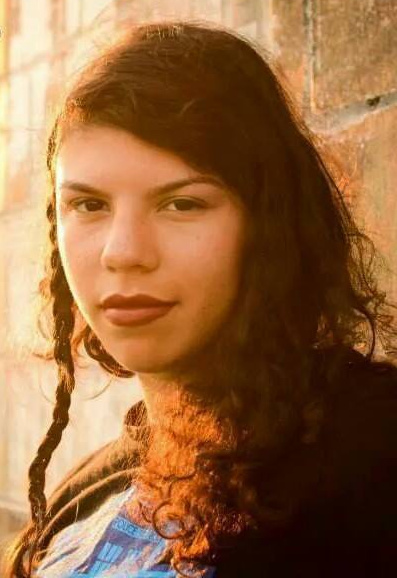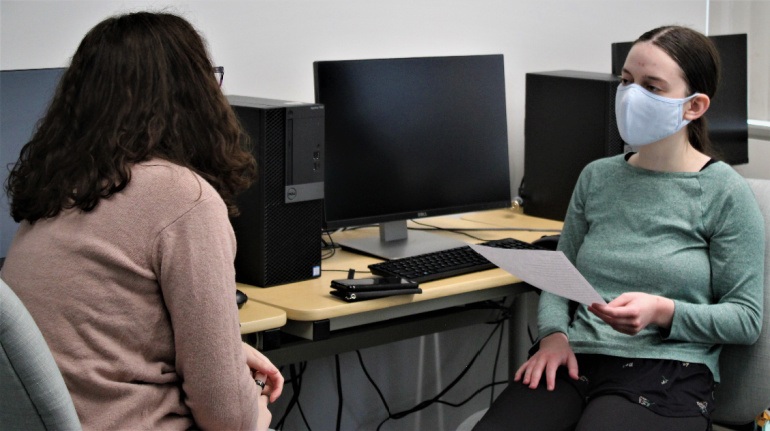
The History Communication Lab is celebrating Women’s History Month with the Exploring Women’s History with WSU web page, highlighting four women’s history projects by current students. The page also features women’s history research by Wayne State graduate students and faculty, and relevant articles in the WSU archive.
“I wanted to create a resource that not only introduces students to different types of women’s history and different figures in women’s history, but also to the research that’s being done on campus,” said graduate student Rebecca Phoenix, who is the lab intern at the History Communications Lab and put together Exploring Women’s History with WSU. “I also wanted to showcase the archive because there's a lot of women in labor information, but a lot of people don’t see it because they might not know how to access it.”
Exploring Women’s History with WSU features four student projects by Lesley Chapel, Nicholas Rhein, Alyssa Noch and Phoenix.
“Our faculty and students do so much amazing work inside and outside the classroom to advance our understanding of women's history,” said Jennifer Hart, associate professor of history and coordinator of the History Communication Lab. “This project was an opportunity to highlight that excellent work and also to demonstrate the kinds of skills that history communicators can develop. Rebecca worked closely with students to develop special spotlights that highlighted their work, and she combed through faculty websites to identify relevant research. This is a great showcase of the kinds of work being done in the department, and it provides an incredible resource for our Wayne State community and the general public to learn more about women's history.
“We also hope it showcases the History Communication Lab as an important campus resource. We would love to work with anyone in the Wayne State community who has an interest in history, helping connect them with resources and personnel who can help advance their goals.”

The History Communication Lab takes research and converts it into digital platforms that are more accessible and user-friendly than a traditional research paper.
“I think that academics are really, really bad at promoting themselves — at least in a general sense,” said Phoenix, who is enrolled in the joint M.L.I.S./M.A. in public history program. “There are some rock stars who really have mastered social media and digital communications, and then there are others who have not yet. I would hate for the ones who haven’t yet to not be able to share their work in the same way and miss opportunities. Our job, as the lab, is to create more opportunities for public education and history communication by merging historical research with digital platforms. We want to create projects that go beyond the traditional paper.”
Chapel’s project is called “Lavender Magnolias: Heteronormativity, Domesticity, and Lesbian Identity in the South during the 1960s-1970s.”
“Chapel’s project a really interesting take and comes to the conclusion that you don't have to give up being a southern woman to also be a queer woman,” Phoenix said. “I thought that was an excellent piece of research. Originally, it was around a 25-page research paper, and we condensed it down to a really nice blog post.”
Rhein’s project is a presentation called “The Astronaut Family: A case study in American Cold War gender representation in popular media.” This is the focus of Rhein’s larger graduate research.
“Rhein’s project is really nice because we got to focus on photos and do more visual learning. The exploration of gender during this time can be very complex, so the photos add a demonstration of Rhein’s concepts,” Phoenix said.
Phoenix and Noch have turned Noch’s project into a mini documentary called “Remembering the Comfort Women Through the Stage: An Examination of Transnational Memory.”
“The documentary we're working on is focused on the legacy of how the international public interacts with the memory of comfort women and how it appears in theatrical arts,” Phoenix said.
Phoenix’s project is called “The Unusual Six: A Case Study of the Horner Sisters in Victorian Women’s Networking.” Phoenix won the 2019 UROP and Sterne-Lion Research Scholarship in 2020 for the project.
“I made a video presentation on the Horner sisters, who were these academic women, and I found their research interesting, but I couldn't distinguish their research from their husbands’ research,” Phoenix said. “Because of the nature of scientific couples, everything got rolled in under the husbands’ names. What I noticed between their letters was they did their own networking for their husbands in a way that their husbands couldn’t. They were communicating with the other women around the scientific men. I tried to show women weren’t just doing the science — they were upholding the collaborative structure and integral to intellectual exploration.”
Exploring Women’s History with WSU is the second major project Phoenix has done with the History Communication Lab, and she is planning several others. Phoenix encourages students to bring in their research and have the lab help them translate it into something more user friendly.
“As a researcher, some of the papers I have had to read have not been really accessible,” Phoenix said. “Some take me a couple of days to read just because of how academic the language is —.I can imagine there are people who might be interested in that topic, but don’t have the ability or time to sift through the information. Being able to share our research as professionals is key not only to the survival of the profession, but also to our ability to stimulate future knowledge. If a researcher produces a really interesting piece of scholarship that could be beneficial beyond an academic audience, it is to everyone’s detriment if it has a limited capacity to inspire.”
Hart also encourages students to visit the lab, the lab’s web site or follow them on Twitter, @historyatwayne. She’s been pleased with the work Phoenix has done thus far and hopes more students will take advantage of the lab.
“Rebecca has been an incredible leader in developing the History Communication Lab as an active resource for students and faculty,” Hart said. “This project is such an excellent example. She has combined her skills in historical research, design and marketing to produce this really impressive product that lifts up the work of individuals in our community. Rebecca is truly exceptional in many ways, but it's important to note that anyone can learn these skills. The History Communication Lab is there to help support that, and Rebecca is a great resource. I've been so pleased to work with her and learn new ways to connect with and support students.”
